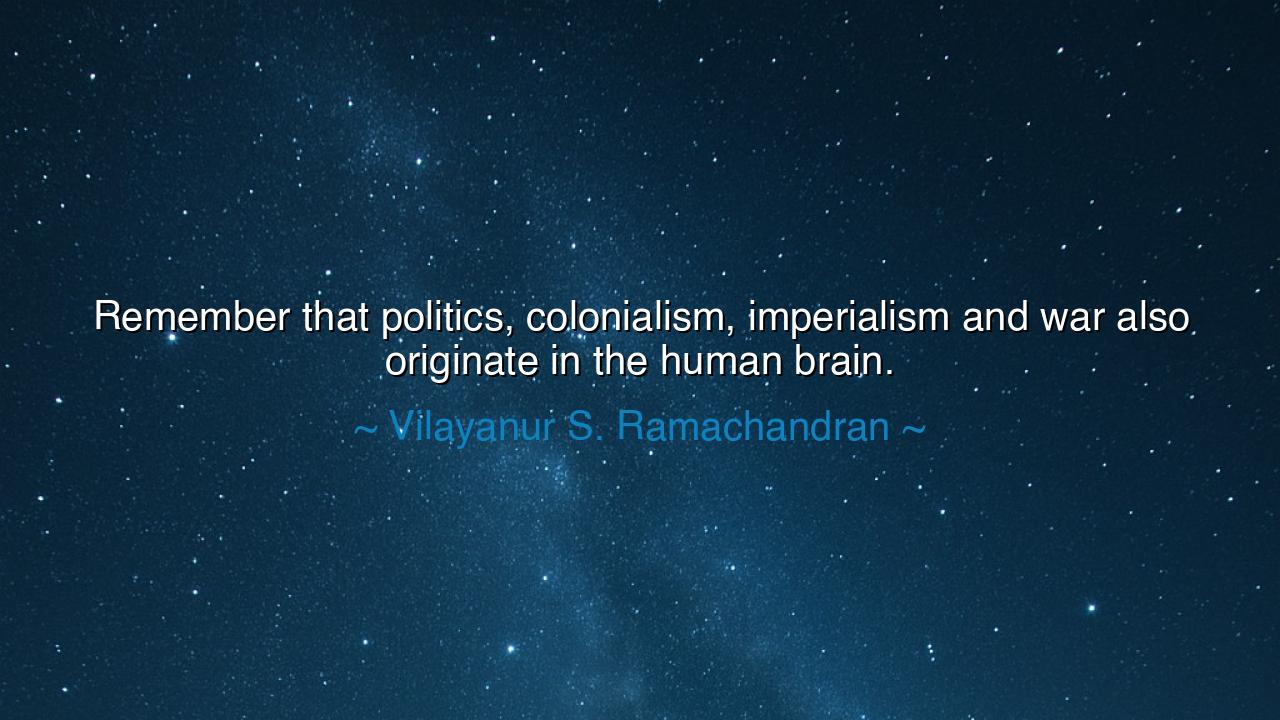
Remember that politics, colonialism, imperialism and war also
Remember that politics, colonialism, imperialism and war also originate in the human brain.






Vilayanur S. Ramachandran, a seeker of the mysteries of the mind, declared with piercing clarity: “Remember that politics, colonialism, imperialism and war also originate in the human brain.” These words are not the musings of a philosopher removed from reality, but the insight of a scientist who studied the seat of thought itself. He reminds us that the great upheavals of nations, the tragedies of conquest, and the horrors of bloodshed do not emerge from the earth nor fall from the heavens—they arise from within us. It is in the folds of the human brain that ambition is born, that greed takes root, that fear is magnified, and that hatred is kindled.
The origin of this teaching lies in Ramachandran’s work as a neuroscientist, where he explored how the brain gives rise to perception, emotion, and behavior. He saw that every empire, every act of imperialism, every structure of colonialism, and every decision to wage war begins with an idea, a desire, a calculation formed in the minds of men. The armies that march, the ships that cross oceans, the governments that plot domination—all are but extensions of thoughts first forged in the hidden chambers of the brain. Thus, he strips away illusion and points us toward responsibility: if the mind gives birth to conquest, then it is the mind that must be trained to seek peace.
The meaning of his words reaches deep: for too often, mankind imagines that war is inevitable, that colonialism was destiny, that politics is an external force beyond our control. But Ramachandran reminds us that these forces are not separate from us—they are us. The same brain that composes music and writes poetry is the brain that invents weapons and justifies domination. This dual nature is both terrifying and hopeful. Terrifying, because the potential for cruelty is within every human; hopeful, because if evil originates in the brain, so too can compassion, restraint, and wisdom.
Consider the history of colonialism. When European powers carved up Africa in the nineteenth century, it was not rivers and mountains that dictated borders, but thoughts conceived in councils and palaces. Men with maps and pens divided vast lands, ignoring the lives of millions. The suffering that followed—famine, conflict, displacement—was born first as ideas in human minds. Here Ramachandran’s words take flesh: the root of oppression is not geography, but cognition. And just as the brain once justified domination, so too could it have chosen justice and respect.
Or reflect upon the Cuban Missile Crisis of 1962. The world trembled on the edge of annihilation, not because the bombs launched themselves, but because human brains in Moscow and Washington weighed, hesitated, and decided. It was the restraint of thought, the recognition of shared destruction, that pulled the world back from the abyss. This stands as proof that though the brain may create the peril of war, it may also choose the path of survival. Within the mind lies both destruction and deliverance.
The lesson is eternal: if the origin of politics, colonialism, imperialism, and war is the brain, then the cultivation of peace must also begin there. It is not enough to disarm weapons if we do not disarm minds. It is not enough to redraw borders if we do not redraw the patterns of thought that gave rise to conquest. The true battlefield is the inner one—whether greed conquers generosity, whether fear conquers trust, whether hatred conquers compassion. To master the brain is to master the destiny of nations.
Therefore, my children of tomorrow, seek not only to sharpen your intellect, but to discipline your heart. Train your mind as a warrior trains his body—not for domination, but for harmony. When ambition tempts you, recall the ruins left by empires. When anger rises, remember the graves left by wars. When greed whispers, remember the chains of colonialism. And when despair tells you peace is impossible, remember that it is the same brain that invents war that also dreams of justice.
So let Ramachandran’s teaching resound: all that is destructive originates in the brain, but so too does all that is noble. Guard your thoughts, for from them rise the deeds of nations. Choose to cultivate wisdom, compassion, and restraint, and you will build not empires of conquest, but communities of peace. In this lies the truest victory: to conquer the battlefield of the mind, and in doing so, to preserve the hope of the world.






AAdministratorAdministrator
Welcome, honored guests. Please leave a comment, we will respond soon